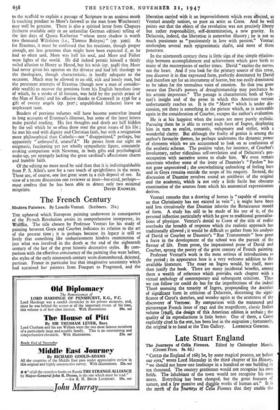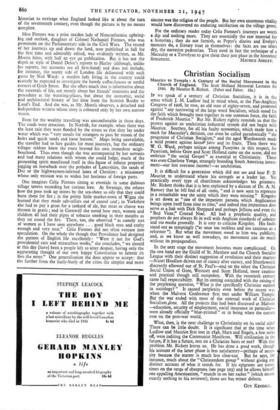Late Stuart England
The Journeys of Celia Flennes. Edited by Christopher Morris. (Cresset Press. 8s. 6d.) The Journeys of Celia Flennes. Edited by Christopher Morris. (Cresset Press. 8s. 6d.) " COULD the England of 1685 be, by some magical process, set before our eyes," wrote Lord Macaulay in the third chapter of his History, "we should not know one landscape in a hundred or one building in ten thousand. The country gentleman would not recognise his own fields. The inhabitant of the town would not recognise his own street. Everything has been changed, but the great features of nature, and a fcw passive and durible works of human art." It is the merit at the Yourttos bf Celia Flennes that they enable the
historian to envisage what England looked hie at about the turn of the seventeenth century, even though the picture is by no means complete.
Miss Fiennes was a prim maiden lady of Nonconformist upbring- ing and outlook, daughter of Colonel Nathaniel Fiennes, who was prominent on the Parliamentary side in the Civil Wars. The record of her journeys up and down the land, now published in full for the first time and admirably edited, was evidently written, as Mr. Morris hints, with half an eye 9n publication. But it has not the depth or style of Daniel Defoe's reports to Harley (although, unlike his reports, her accounts are all first-hand) and does not include, for instance, the seamy side of London life delineated with such gusto by Ned Ward: a maiden lady living in the country could scarcely be expected to investigate the bawdy coffee-houses or sordid corners of Grub Street. But she offers much that is informative about the externals of life, not merely about her friends' mansions and the procedure at the watering-places, but about the economic, social and architectural history of her time from the Scottish Border to Land's End. And she was, as Mr. Morris observes, a detached and independent witness whose story is coloured only by her own narrow vision.
Even for the wealthy travelling was uncomfortable in those days. The roads were atrocious. In Norfolk, for example, when there was the least rain they were flooded by the rivers so that they lay under water which was "very unsafe for strangers to pass by reason of the holes and quick sands and loose bottom." Maps being unavailable, the traveller had to hire guides for most journeys, but the ordinary villager seldom knew the route beyond his own immediate neigh- bourhood. Thus even though she was accompanied by her servants and had many relations with whom she could lodge, much of the pioneering spirit manifested itself in this figure of infinite propriety jogging on horseback over the potholes of Lancashire, the sands of Dee or the highwaymen-infested lanes of Cheshire: a missionary whose only mission was to widen her horizons of foreign parts.
One imagines Celia Fiennes sitting at eventide in some dubious village tavern recording her curious lore. At Swanage, she relates how the poor took up stones by the sea-shore so oily that they could burn them for fire ; in the pretty little market-town of Wigan she learned that they made salt-cellars out of cannel coal ; in Yorkshire she had to pay a groat for a tankard of ale, but meat or cheese was thrown in gratis ; and in Cornwall she noted how men, women and children all had their pipes of tobacco smoking in their mouths as they sat round the fire. There, too, she observed " as comely sort of women as I have seen anywhere . . . good black eyes and crafty enough and very neat." Celia Fiennes did not often venture into speculation. On the whole she though that Providence had designed the pattern of English life excellently : " Were it not for God's providential care and miraculous works," she concludes, " we should at this day [have] been a people left to utter despair, having only the aggravating thought of our own happy Constitution to lament its loss the more." One generalisation she does appear to accept: that the further from the hurly-burly of the cities the simpler. and more sincere was the religion of the people. But her own enormous vitality would have discovered no enduring satisfaction on the village green.
For the ordinary reader today Celia Fiennes's journeys are worth a dip and nothing more. They are essentially the raw material for a historian; do not furnish, as Pepys's diaries and Evelyn's memoirs dc, a literary treat in themselves : the facts are too often dry, the narration pedestrian. They need in fact the technique of a Macaulay or a Trevelyan to give them their just place in the historical



































 Previous page
Previous page